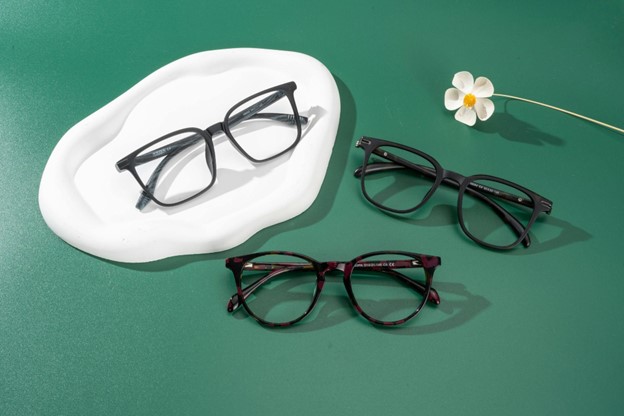
The Truth About Blue Light Glasses: Do You Really Need Them?
Blue light glasses are everywhere, from drugstores to designer boutiques. Many wear them while working, streaming, or scrolling, hoping to reduce screen-related fatigue or improve sleep.
Concerns about digital eye strain and sleep quality have made these glasses especially popular. But do blue light glasses work as well as they claim? Or are they a stylish solution to a misunderstood problem?
Let’s examine the science behind blue light-blocking glasses, what they’re meant to do, and whether they live up to the hype.
Understanding Blue Light and Its Source
Blue light is a high-energy visible (HEV) light found on the visible spectrum, just above ultraviolet (UV) light. It’s all around us and not just from digital screens.
Where It Comes From:
● Natural Sources: The sun is the largest emitter of blue light
● Artificial Sources: Screens from smartphones, tablets, laptops, and LED lighting.
Screens emit far less blue light than sunlight. Still, exposure to artificial blue light, especially at night, has raised questions about potential impacts on the eyes and sleep patterns.
What Are Blue Light Glasses Supposed to Do?
Manufacturers of blue light filter glasses often claim their products can:
● Reduce digital eye strain
● Prevent screen-related headaches
● Improve sleep by limiting melatonin disruption
● Protect eyes from long-term retinal damage
These claims make the glasses sound like a must-have tool for screen users. But what does current research say?
Do Blue Light Glasses Work?
Let’s break down the available science behind each claim.
Digital Eye Strain
The discomfort we call “screen fatigue” usually stems from extended near work. This includes reduced blinking, poor posture, and improper screen settings. According to the American Academy of Ophthalmology (AAO), blue light and eye strain are not directly linked. There’s no strong evidence that filtering blue light relieves screen-related eye fatigue.
Sleep Disruption
This is where blue light plays a stronger role. Exposure to blue light in the evening, especially from phones or tablets, can delay melatonin production, which affects the sleep-wake cycle. Some studies suggest that blue light glasses reduce this interference, helping people fall asleep more easily after evening screen use.
Long-Term Eye Protection
Claims that blue light causes retinal damage or contributes to macular degeneration are unproven. So far, no major study has confirmed that screen-based blue light harms the eyes in the long term. The levels emitted from devices are too low to cause direct damage.
Verdict
So, are blue light glasses effective? They might help nighttime users sleep, but blue light and eye strain may not be as directly linked as we thought, and neither do they prevent disease. The placebo effect could play a role in perceived relief for some users.
Do You Need Blue Light Glasses for Screens?
Some people may benefit from using computer glasses for eye strain, primarily if they work late or feel more comfortable with tinted lenses.
When they might help:
● You spend long hours on screens at night.
● You notice better sleep after using them in the evening.
● You prefer them and feel more focused or comfortable while wearing them.
These glasses are not harmful, but they aren’t a universal solution. Eye health depends more on behavior and overall habits than on accessories.
Alternatives to Blue Light Glasses That Actually Work
You don’t need special eyewear to fight digital eye strain. Simple adjustments can be more effective and cost nothing.
Try These Backed Techniques:
● 20-20-20 Rule: Every 20 minutes, look at something 20 feet away for 20 seconds.
Screen Settings: Lower brightness and adjust contrast for comfort.
● Positioning: Keep screens 20–28 inches from your eyes and slightly below eye level.
● Blink More Often: Staring reduces blinking, causing dry eyes.
● Take Regular Breaks: Step away from the screen every hour.
● Night Mode Settings: Use built-in features that reduce blue light in the evening.
These changes directly reduce fatigue and eye dryness, so no glasses are required.
Tips for Choosing Quality Blue Light Blocking Glasses
If you're curious to try blue light blocking glasses, choose a pair that meets some basic quality standards. Avoid products that rely only on trendy branding or inflated prices.
What to Look For:
● Filter Range: Lenses should block 400–450 nm blue light.
● Minimal Color Distortion: Avoid lenses that overly tint or darken your view.
● Optional UV Protection: It’s separate from blue light but still useful outdoors.
● Comfortable Fit: Frames should sit properly to avoid pressure or distraction.
● Realistic Pricing: High cost doesn't always mean high quality.
Focus on comfort and evidence, and not advertising promises.
Blue Light Glasses: When They Help and When They Don’t
| Claim | Supported by Research? | Notes
| Reduce eye strain | ❌ | Other factors often cause discomfort
| Improve sleep when used at night | ✅ (moderate evidence) | It may help regulate melatonin
| Prevent headaches | ❌ | No consistent data
| Protect against long-term damage | ❌ | No conclusive evidence
| Useful for night screen use | ✅ (situational) | Especially for sensitive users
Final Thoughts: Making an Informed Choice
Blue light glasses may provide mild benefits, especially for those who use screens at night. Some people find them helpful for sleep or comfort, even if the science doesn’t confirm dramatic results.
They’re not essential for protecting your eyes and don’t replace smart habits like screen breaks or proper lighting. Most importantly, they’re not a substitute for regular eye exams or professional care.
To support your vision over time, focus on proven methods, balanced screen use, eye-friendly nutrition, and routine checkups.
Quick Hacks to Reduce Eye Strain Without Glasses
● Blink frequently
● Use artificial tears
● Adjust room lighting
● Take mini movement breaks
● Avoid screen glare
Visit Healthy Vision Association for more facts and tips about screen time, eye protection, and preventive vision care.
